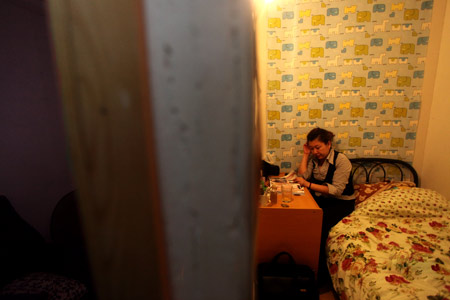A house divided
After a long and weary day of apartment hunting, 24-year-old Gong Lijuan from Central China's Henan Province finally found a place she could afford - a windowless eight-square-meter single room separated from the living area of a standard two-bedroom apartment near the East Sixth Ring Road in Beijing, which she shares with her college friend.
 |
|
A female university graduate lives in a six-square-meter room that costs her 300 yuan ($45) a month in Beijing. The tenant only earns 1,800 yuan ($27) a month working in a bank. |
The 100-square-meter apartment accommodates a total of 10 people who live in six separate rooms ranging in price from 400 to 1,000 yuan ($60 to $150) per month. The shared bathroom is filthy and smelly, while a thin wooden wall used as a partition does little to keep the sound out from the next room.
"This is the best I could afford," said Gong, who makes 2,000 yuan ($300) per month after graduating from college this summer.
Gong is just one example of millions of young graduates and other low-income earners who come to cities like Beijing in search of a better life, and are then forced to cram themselves into tiny living spaces. Now, they might be deprived of even that, thanks to a recently issued regulation by China's top housing authority.
According to the Regulation on Commercial House Rental issued by the Ministry of Housing and Urban-Rural Development last week, the first of its kind in 15 years, the amount of space for each tenant should not be less than the minimum standard required by local authorities, and apartments should only be leased the way they were originally intended to.
In addition, the regulation made it clear that kitchens, bathrooms, balconies and basements should not be rented out as bedrooms, and anyone who violates this rule will have to pay a fine of up to 30,000 yuan ($4,500).
Under the new regulation, Gong and her roommate will probably have to move out of their current apartment, as this April Beijing made 10 square meters the minimum renting space.
Too soon
While the move is aimed at clarifying tenants' rights in terms of their living space, the public seems to have taken a rather dim view of the regulation.
Many have criticized it as nothing more than a restriction on joint renting, and are questioning whether it is even necessary before public housing is properly developed in a country with such a massive population.
"If strictly implemented, this new regulation will only cause rents to go up and drive away millions of low-income earners who struggle to make a living in cities like Beijing," said Zhang Dawei, chief analyst of Centaline, a leading real estate agency in China.
Since it has so far not been mandatory for landlords to declare the number of tenants they have living in their properties - something that will change after the rule goes into effect - it is not possible to know how many people are currently living below this minimum standard stipulated in the regulation.
 0
0 







Go to Forum >>0 Comments